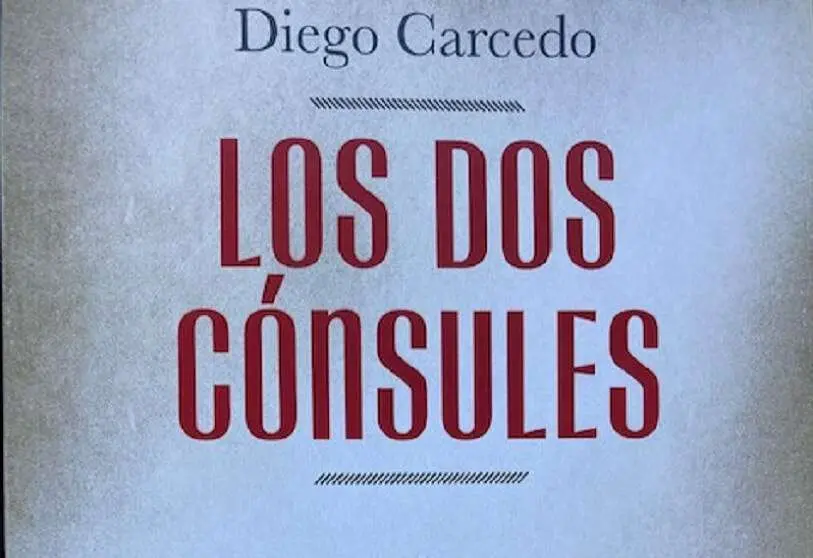Two righteous consuls among nations

There are still many heroes to be vindicated and many personal stories to be told that can lead us to reflect on the human race, whose individuals are capable of the best and the worst, as is well known. The veteran journalist and historian Diego Carcedo once again places us before the mirror of the miseries and greatness of men, which almost always emerge when circumstances and the environment become extreme. A mirror that is impossible not to evoke now, when the apocalyptic horseman of war has once again descended on a part of Europe, with millions of people fleeing destruction, misery and death.
"Los Dos Cónsules" (Espasa, 295 pages) is the new work in which Carcedo delves into the epic adventures during the Second World War of two diplomats, the Spaniard Eduardo Propper de Callejón and the Portuguese Aristides de Sousa Mendes, both consuls in the French port city of Bordeaux.
Officials in the service of their respective countries, then ruled by the implacable dictatorships of Francisco Franco and Antonio de Oliveira Salazar, they will confront their respective hierarchies to tirelessly facilitate the escape of thousands of Jews. Their own inner struggle, their daily struggle to evade controls and deceive their commanders, make up a new epic tale of these anonymous heroes, considered traitors to the authority of their superiors, and as such, facing the corresponding and serious personal consequences for their own lives. They will make their principles triumph, which will sustain their spirits despite the repeated temptation to give up, not to complicate their lives or simply to do nothing, which in that situation was tantamount to collaborating in the capture, torment and death of thousands of human beings.
We have already had previews by Diego Carcedo himself, which have brought to light figures such as Ángel Sanz Briz in Budapest, and which rescue for the general public the epic of people who, thanks to the advantages of their position, were faced with the dilemma of whether or not to obey their conscience, knowing what was at stake, precisely because of the privilege of that position.
 The harsh price of heroism
The harsh price of heroism At the time of this novel, the blitzkrieg (lightning war) launched by the Third Reich was sweeping across the continent. Leopold III had already announced the surrender of Belgium, the Wehrmacht was trampling the sovereignty of its neighbours with its armoured vehicles, the Luftwaffe was bombing London and other major British cities. Nothing seemed to stop this devastating advance, so Benito Mussolini proclaimed that Fascist Italy was joining the Nazis and declared war on France and Britain. He did so on the same day, 10 June 1940, that Franco, contemplating this pact between the dictators of Italy and Germany, the allies who had helped him win the Civil War, announced that Spain was changing its declared neutrality for the status of a non-belligerent country.
It is at this point that Carcedo introduces an anonymous Spanish reporter, whom his Madrid newspaper sends as a correspondent to Bordeaux, a city taken over in that early summer by thousands of people fleeing chaotically from the unstoppable advance of the Nazis, who have already conquered Paris.
The author uses that reporter to describe and narrate the efforts of the two diplomats, in whom the Jews will unexpectedly find the friendly hands that will give them comfort and relief in their desperate flight, and the hope that they will be able to recover and rebuild their lives at the end of that nightmare. In order to document the story, Carcedo divces into the correspondence of the survivors, the messages from friends and from the Jews saved by the two consuls themselves, who do not fail to express their gratitude to those who had protected them.
Aristides de Sousa Mendes and Eduardo Propper de Callejón suffered harsh reprisals from their respective governments, much more tragic those that condemned the Portuguese consul to extreme poverty than those that befell his Spanish colleague. The former died in 1954 in such a state of misery that a religious community had to provide a habit to shroud his corpse. Propper, rehabilitated, died in London in 1972, without having been able to enjoy the success of his granddaughter, the actress Helena Bonham Carter, who always claims to be proud of her grandfather. The two Iberian diplomats are recognised as "Righteous Among the Nations" at Yad Vashem in Jerusalem. Trees planted in their honour display the biblical dictum that states "Whoever saves one person is as if he saved the whole of humanity".









